Helping you keep your commitment to oral care.
Smile Back – It Changes Everything
COMMON QUESTIONS
Gum disease treatment.
Swollen and tender gums are symptoms of gum disease.
Even with adequate dental hygiene, you can develop gum disease. Finding the right dental office for gum disease treatment can help ease the uncomfortable pain that comes with periodontal disease.
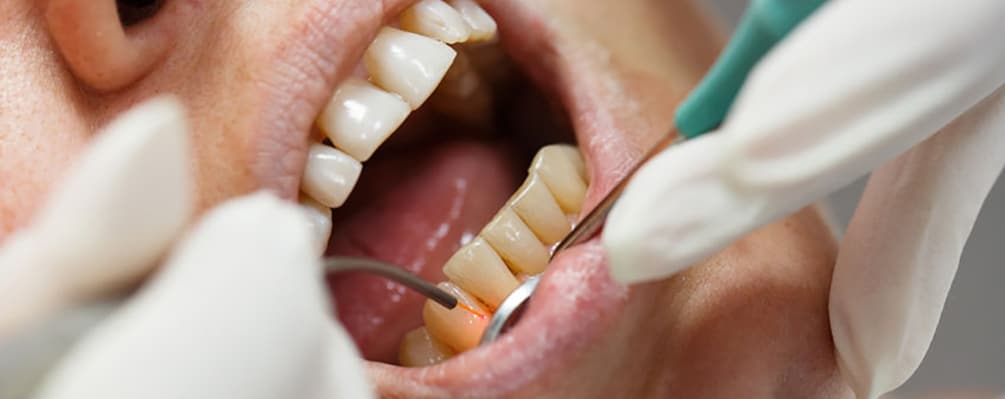
What Is Gum Disease?
Gum disease, often referred to as periodontal disease, occurs when harmful bacteria grow beneath the gum line and infects your gums. A dentist or periodontist will explain that there are two stages of the disease:
- Gingivitis: Bacteria and plaque begin to irritate your gums.
- Periodontitis: Bacteria burrow beneath the gum line and infect your gum tissue.
If you experience any warning signs of gum disease, immediately getting to your local dentist office may help prevent the disease from becoming more severe. The DeJesus Dental Group hygiene team will carefully remove the bacteria, plaque, and tartar that collect on your teeth. However, waiting to see your dentist can lead to periodontitis, which can be treated but cannot be cured.
Early Signs of Gum Disease
A change in your gums that causes them to be tender, swollen, or red are early warning signs of gum disease. If you notice blood after brushing or flossing, that could indicate a stage of gum disease. Gingivitis is often evident in those with chronic bad breath, while periodontitis can cause teeth to loosen or fall out.
Scaling and Root Planing
When that bacteria climb below the gum line, scaling and root planing are necessary. During this procedure, we gently reach below your gums to scrape away the plaque and tartar build-up. This is a non-surgical gum disease treatment method and is often effective in stopping gingivitis.
Before
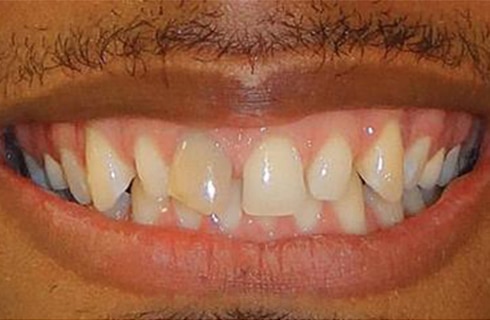
After
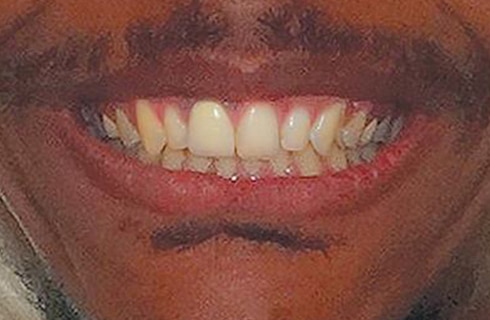
t
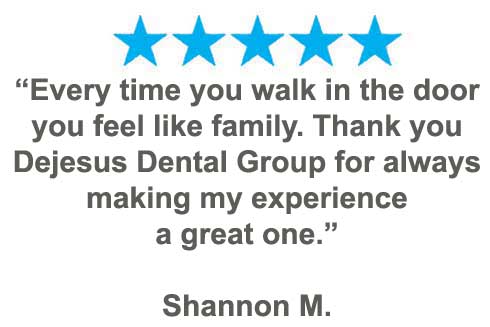
How Can Lasers Help With My Gums?
If gum tissue is affected by periodontal disease, dental lasers can be carefully used to remove the infected gum tissue without surgery. We offer this painless procedure to help alleviate the discomfort that comes with gum disease.
The DeJesus Dental Group can help you have healthy gums for a lifetime. For more information on our non-surgical gum disease treatment methods, call our dental office in Shelton or Bridgeport or you can book an appointment online.
Let's keep your oral health a priority.
Request a new patient special, implant, or orthodontic
consultation today.
Gum disease treatment.
Swollen and tender gums are symptoms of gum disease.
Even with adequate dental hygiene, you can develop gum disease. Finding the right dental office for gum disease treatment can help ease the uncomfortable pain that comes with periodontal disease.
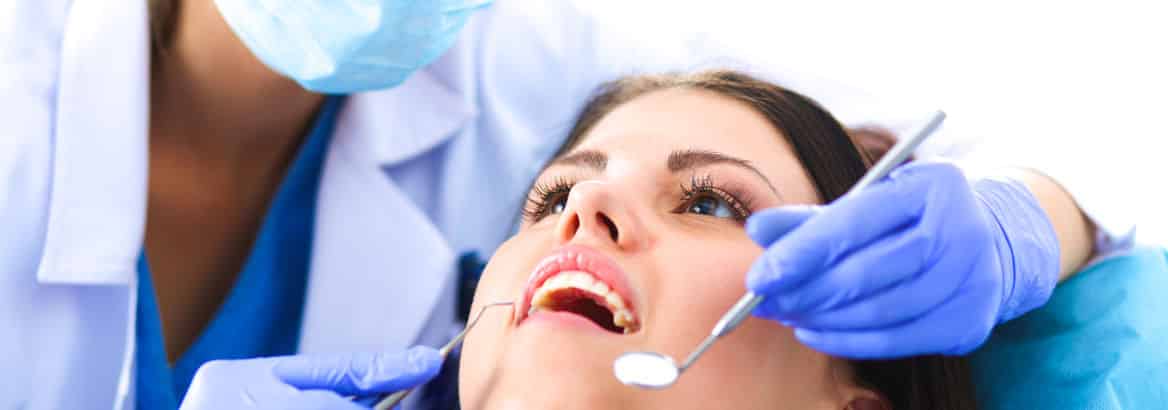
What Is Gum Disease?
Gum disease, often referred to as periodontal disease, occurs when harmful bacteria grow beneath the gum line and infects your gums. A dentist or periodontist will explain that there are two stages of the disease:
- Gingivitis: Bacteria and plaque begin to irritate your gums.
- Periodontitis: Bacteria burrow beneath the gum line and infect your gum tissue.
If you experience any warning signs of gum disease, immediately getting to your local dentist office may help prevent the disease from becoming more severe. The DeJesus Dental Group hygiene team will carefully remove the bacteria, plaque, and tartar that collect on your teeth. However, waiting to see your dentist can lead to periodontitis, which can be treated but cannot be cured.
Early Signs of Gum Disease
A change in your gums that causes them to be tender, swollen, or red are early warning signs of gum disease. If you notice blood after brushing or flossing, that could indicate a stage of gum disease. Gingivitis is often evident in those with chronic bad breath, while periodontitis can cause teeth to loosen or fall out.
Scaling and Root Planing
When that bacteria climb below the gum line, scaling and root planing are necessary. During this procedure, we gently reach below your gums to scrape away the plaque and tartar build-up. This is a non-surgical gum disease treatment method and is often effective in stopping gingivitis.
Before

After


How Can Lasers Help With My Gums?
If gum tissue is affected by periodontal disease, dental lasers can be carefully used to remove the infected gum tissue without surgery. We offer this painless procedure to help alleviate the discomfort that comes with gum disease.
The DeJesus Dental Group can help you have healthy gums for a lifetime. For more information on our non-surgical gum disease treatment methods, call our dental office in Shelton or Bridgeport or you can book an appointment online.
Let's keep your oral health a priority.
Request a new patient special, implant, or orthodontic consultation today.
What Are You Waiting For?
BRIDGEPORT/TRUMBULL LINE
4131 MAIN ST, BRIDGEPORT, CT 06606
SHELTON
770 RIVER RD SHELTON, CT 06484
Related Articles
Dental Tips for Young Athletes: Protecting Your Smile
This article provides a comprehensive guide to understanding dental insurance, covering key terms, types of plans, and the enrollment process. It offers practical advice on maximizing benefits through preventive care, understanding coverage, and managing out-of-pocket expenses. The blog also highlights common pitfalls to avoid and addresses frequently asked questions about dental insurance. By staying informed and strategically using benefits, individuals can maintain their oral health affordably and effectively.
Navigating Dental Insurance: Tips for Maximizing Your Benefits
This article provides a comprehensive guide to understanding dental insurance, covering key terms, types of plans, and the enrollment process. It offers practical advice on maximizing benefits through preventive care, understanding coverage, and managing out-of-pocket expenses. The blog also highlights common pitfalls to avoid and addresses frequently asked questions about dental insurance. By staying informed and strategically using benefits, individuals can maintain their oral health affordably and effectively.
Pregnancy and Dental Health: What Every Expecting Mother Should Know
Maintaining oral health is crucial during pregnancy. Hormonal changes can significantly impact your gums and teeth, making it vital to understand how to care for your dental health during this time. This blog will guide you through the essentials of dental care while...
DeJesus Dental Group
Serving all of Fairfield County
4131 Main St | Bridgeport, CT 06606
770 River Rd | Shelton, CT 06484
© 2024 DeJesus Dental Group. All Rights Reserved.
Sitemap | Website Privacy Statement | Website Terms Of Use | Governmental Compliance Statement | Website Accessibility Guide | Language Assistance Guide



